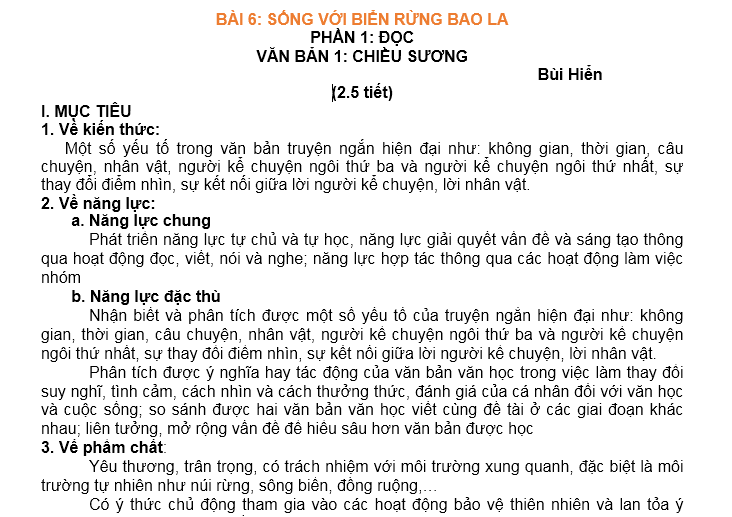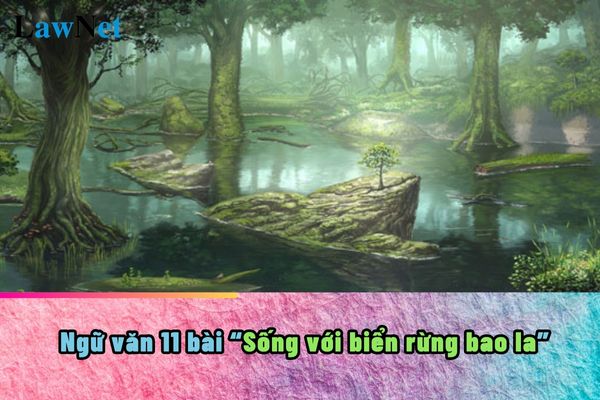Lesson plan for the lesson "Sống với biển rừng bao la" in the grade 11 Literature in Vietnam
Lesson plan for the lesson "Sống với biển rừng bao la" in the grade 11 Literature in Vietnam
The new school year has begun, therefore, preparing lessons is extremely essential for students to gain a deeper understanding of their lessons.
Below, students and teachers can refer to the lesson "Sống với biển rừng bao la" in the grade 11 Literature in Vietnam as follows:

>>> Download the lesson plan for the lesson "Sống với biển rừng bao la" in the grade 11 Literature in Vietnam for 2024-2025.
*Note: Above information is for reference only./.

Lesson plan for the lesson "Sống với biển rừng bao la" in the grade 11 Literature in Vietnam (Image from the Internet)
What are requirements for grade 11 Vietnamese Literature?
Based on Section IV, Annex of the General Education Program for Vietnamese Literature issued together with Circular 32/2018/TT-BGDDT, requirements for grade 11 Vietnamese Literature include:
- Apply knowledge of the Vietnamese language and knowledge about historical, social, ideological, philosophical contexts, and aesthetic perceptions of different periods to understand more complex texts (evidenced by length, complexity, and reading comprehension requirements).
- Analyze and evaluate the content and prominent features of expressive forms of the text, especially the creative explorations in language, writing styles, and text types. Students have their perspectives and thoughts about humans and life; realize the role and impact of reading on themselves.
- From grades 10 to 12: proficiently write argumentative and explanatory texts on topics related to life and career orientation; write according to the process, integrating various expressive methods, argumentative types, and artistic elements; have an independent viewpoint on a social issue.
- Write argumentative and informational texts on relatively complex topics; argumentative texts require analyzing, evaluating, and comparing the artistic values of literary works; discuss issues suitable for individuals nearing adulthood, requiring relatively complex structures and argumentative styles, with evidence gathered from multiple sources; explanatory texts address scientific issues in the form of a properly formatted research report; adhere to intellectual property rights and avoid plagiarism.
- The writing reflects emotions, attitudes, personal experiences, and ideas about the issues posed in the text; embodying a unique perspective, way of thinking, and lifestyle.
- Engage in debates on contentious issues; have an open and appropriate cultural attitude towards debates; the ability to listen to presentations and assess the content and expressive form of the presentation; have an interest in expressing independent viewpoints and personality in debates; confidently and persuasively present scientific issues. Speak and listen flexibly; master methods and processes for conducting a debate.
- Literary Competence
Analyze and evaluate literary texts based on an understanding of artistic styles and literary history. Recognize the characteristics of literary imagery and some differences between literary imagery and other types of artistic imagery (painting, music, architecture, sculpture); analyze and evaluate the ideological content and the mode of expressing ideological content in a literary text; recognize and analyze the characteristics of literary language, stories, plots, and narration; recognize and analyze some artistic style characteristics in folklore, medieval, and modern literature; the artistic style of some major authors and works.
Summarize the general aspects of national literary history (development process, major topics and themes, major authors and works; some values of national literature in content and form) and apply them to reading literary works.
Create some types of literary texts showcasing the ability to express emotions and ideas in an aesthetically pleasing verbal form.
What are the overall objectives when teaching grade 11 Vietnamese Literature?
Based on Section III, Annex of the General Education Program for Vietnamese Literature issued together with Circular 32/2018/TT-BGDDT, the grade 11 Vietnamese Literature program is as follows:
- Develop and foster essential qualities in students: patriotism, empathy, diligence, honesty, and responsibility; nurture the soul, shape character, and develop personality.
The Vietnamese Literature subject helps students explore themselves and the surrounding world, understand humanity, have a rich spiritual life, possess humane living and behavior perspectives; love the Vietnamese language and literature; be conscious of their roots and national identity, contributing to preserving and developing Vietnamese cultural values; have a spirit of embracing global cultural essence and the ability to integrate internationally.
- Contribute to developing general competencies in students: autonomy and self-study, communication and cooperation, problem-solving, and creativity.
Particularly, the Vietnamese Literature subject helps students develop linguistic competence and literary competence: train skills in reading, writing, speaking, and listening; have a foundational system of basic knowledge about Vietnamese and literature, develop imaginative and logical thinking, contribute to forming fundamental academic knowledge in a cultured person; know how to create common documents; know how to receive and evaluate literary texts specifically, communication products, and general aesthetic values in life.

